Best Teas and Herbal Blends for Calmness: Nature’s Way to Restore Inner Peace
Introduction
In a world that moves faster every year, calmness has become a rare luxury — but it doesn’t have to be. One of the simplest, most time-tested ways to restore balance is found in a humble ritual: a cup of tea.
The warmth, aroma, and rhythm of brewing and sipping tea can anchor you in the present moment — calming both the nervous system and the mind. Beyond its psychological comfort, certain herbal blends contain bioactive compounds that genuinely help regulate stress hormones, soothe the digestive system, and ease tension.
This guide explores the best calming teas, their benefits, and how to build your own tea rituals for deeper relaxation and resilience. 🍵
Looking for supplements for this? Click here.
🌸 The Science of Calm: How Tea Affects the Nervous System

Tea does far more than warm you up — it influences your neurochemistry.
🧠 The Body’s Stress Response
When you’re anxious, your brain triggers the HPA axis, releasing cortisol and adrenaline. These hormones prepare you to “fight or flee,” but chronic activation leads to fatigue, irritability, and anxiety.
Certain herbs can modulate this response — calming the sympathetic nervous system and activating the parasympathetic (“rest and digest”) state.
🌿 Key Bioactive Compounds in Calming Teas
L-theanine (found in green tea): Increases alpha brain waves, promoting relaxed alertness.
Apigenin (in chamomile): Binds to GABA receptors in the brain, producing mild sedation.
Rosmarinic acid (in lemon balm): Reduces cortisol and supports focus.
Valerenic acid (in valerian root): Influences GABA transmission, easing restlessness.
Adaptogens (ashwagandha, tulsi): Support stress resilience by balancing cortisol rhythms.
💚 Tea is both chemistry and ceremony — science for the body, ritual for the soul.
☕ The Role of Ritual in Relaxation
Calmness doesn’t come from herbs alone — it’s in the ritual itself.
When you boil water, breathe in the steam, and take that first slow sip, you’re signaling safety to your nervous system.
Mindful tea preparation becomes a form of active meditation:
The repetitive movements create predictability.
The warmth engages sensory comfort.
The aroma triggers parasympathetic relaxation.
🪷 Each cup becomes a pause button for your overstimulated mind.
🌼 Chamomile Tea — The Classic Calming Companion
🌿 Botanical Name: Matricaria chamomilla
💫 Best for: Anxiety, insomnia, muscle tension
Chamomile is one of the oldest and most beloved herbs for relaxation. Its soft floral scent carries apigenin, a compound that binds to the brain’s GABA receptors — the same calming pathway targeted by anti-anxiety medications.
🌸 Benefits:
Promotes better sleep quality
Eases mild anxiety
Soothes digestive discomfort (“nervous stomach”)
Reduces menstrual cramps
☕ How to Prepare:
Steep 1 tablespoon dried chamomile flowers in hot (not boiling) water for 5–7 minutes.
Add honey or a touch of vanilla for extra comfort.
💬 A cup before bed feels like a lullaby in liquid form.
Looking for supplements for this? Click here.
🌿 Lemon Balm — The Herb of Gentle Joy
🌿 Botanical Name: Melissa officinalis
💫 Best for: Nervous tension, overthinking, and restlessness
Lemon balm has been called the “herb of gladness” for centuries. It gently lifts the mood while soothing anxiety.
Its rosmarinic acid and terpenes reduce cortisol levels and calm the gut-brain axis — making it excellent for people whose stress shows up as stomach tension.
🌸 Benefits:
Light mood enhancement
Supports digestion during stress
Promotes mental clarity
Combines well with chamomile or lavender
☕ How to Prepare:
Steep 1 tablespoon fresh or 2 teaspoons dried lemon balm for 5–10 minutes.
For a more grounding blend, combine with passionflower or tulsi.
🌿 Lemon balm tea feels like sunshine for the nervous system.
🌼 Lavender Tea — Fragrance for the Soul
🌿 Botanical Name: Lavandula angustifolia
💫 Best for: Anxiety, nervous exhaustion, and insomnia
Lavender’s soothing aroma works through both olfactory pathways and neurochemistry. Studies show that its essential oils reduce heart rate, lower blood pressure, and calm brain activity.
🌸 Benefits:
Promotes sleep and relaxation
Reduces anxiety symptoms
Relieves muscle tension
Enhances mood and focus
☕ How to Prepare:
Use 1 teaspoon dried lavender buds per cup.
Steep for 5 minutes — too long can make it bitter.
Combine with chamomile for bedtime serenity.
💬 Breathing in lavender is like exhaling your worries.
🌿 Passionflower — For Racing Thoughts and Inner Rest
🌿 Botanical Name: Passiflora incarnata
💫 Best for: Mental restlessness and circular thinking
Passionflower doesn’t sedate — it softens.
It increases GABA activity, slowing the overactive mental chatter that fuels anxiety and insomnia.
🌸 Benefits:
Calms overthinking
Reduces mild insomnia
Eases muscle tension
Balances mood swings
☕ How to Prepare:
Steep 1–2 teaspoons dried herb in hot water for 10 minutes.
Excellent blended with lemon balm and chamomile.
🌿 When your thoughts won’t stop spinning, passionflower says, “rest.”
🌼 Tulsi (Holy Basil) — The Sacred Stress-Reliever
🌿 Botanical Name: Ocimum tenuiflorum
💫 Best for: Adaptation to chronic stress and burnout
Tulsi, or holy basil, is revered in Ayurvedic medicine as a spiritual adaptogen. It balances the HPA axis, reduces cortisol, and promotes mental clarity — without sedation.
🌸 Benefits:
Supports long-term stress adaptation
Improves focus and mental energy
Enhances emotional resilience
Balances mood hormones
☕ How to Prepare:
Steep 1 teaspoon dried tulsi leaves for 7–10 minutes.
Blend with ginger or lemongrass for added depth.
💬 Tulsi teaches your body how to stay calm while staying awake.
🌿 Valerian Root — The Natural Sleep Aid
🌿 Botanical Name: Valeriana officinalis
💫 Best for: Insomnia, agitation, and chronic tension
Valerian root is nature’s answer to restless nights. Its valerenic acid interacts with GABA receptors, promoting sedation and easing muscle tightness.
🌸 Benefits:
Helps with sleep onset and quality
Relieves tension headaches
Reduces mild anxiety
Soothes jittery nerves
☕ How to Prepare:
Use 1 teaspoon dried root per cup.
Steep 10 minutes; add mint or lemon to mask its earthy flavor.
⚠️ Avoid mixing with alcohol or sedatives.
💤 Valerian doesn’t knock you out — it invites your body to remember rest.
🌼 Peppermint — Cooling Calm for Mind and Body
🌿 Botanical Name: Mentha × piperita
💫 Best for: Digestive tension, headaches, and heat-related irritability
Peppermint cools both body and mood. Its menthol relaxes smooth muscles and provides a refreshing mental reset.
🌸 Benefits:
Reduces physical tension
Aids digestion under stress
Relieves mild headaches
Provides mental clarity
☕ How to Prepare:
Use fresh or dried leaves, steep 5–7 minutes.
Combine with chamomile or tulsi for holistic calm.
🌿 A peppermint blend refreshes anxiety into alert peace.
🌿 Green Tea — Calm Focus in Motion
🌿 Botanical Name: Camellia sinensis
💫 Best for: Focused calm, mindfulness, and cognitive balance
Unlike herbal infusions, green tea contains mild caffeine — but its L-theanine counteracts stimulation, producing a smooth, alert calm.
🌸 Benefits:
Enhances mental focus without jitters
Increases alpha brain waves (meditative state)
Reduces cortisol
Supports long-term brain health
☕ How to Prepare:
Steep for 2–3 minutes at 80°C (175°F) — not boiling.
Matcha, sencha, or jasmine green tea work beautifully.
💬 Green tea sharpens the mind while softening the edges.
🌼 Rose Tea — The Heart-Soothing Elixir
🌿 Botanical Name: Rosa damascena
💫 Best for: Emotional stress and grief
Rose petals carry flavonoids and a delicate aroma that opens the heart. They soothe both mood and digestion — an excellent choice during emotional overwhelm.
🌸 Benefits:
Calms mood swings
Supports digestion
Reduces inflammation
Enhances emotional well-being
☕ How to Prepare:
Steep 1 tablespoon dried rose petals for 5 minutes.
Add honey and cardamom for a luxurious touch.
🌹 Rose tea feels like self-love in a cup.
🌿 Ashwagandha Tea — Adaptogenic Balance

🌿 Botanical Name: Withania somnifera
💫 Best for: Long-term stress, fatigue, and adrenal recovery
Ashwagandha, an adaptogenic root, supports the body’s ability to maintain homeostasis under stress. It lowers cortisol, stabilizes mood, and boosts vitality.
🌸 Benefits:
Improves resilience to chronic stress
Balances hormones
Reduces anxiety symptoms
Supports physical stamina
☕ How to Prepare:
Simmer 1 teaspoon root powder for 10 minutes in milk or water.
Sweeten with cinnamon or honey.
⚠️ Avoid during pregnancy or with thyroid medication without medical advice.
🌿 Ashwagandha restores what stress has taken.
🌼 Skullcap — The Forgotten Calming Herb
🌿 Botanical Name: Scutellaria lateriflora
💫 Best for: Nervous exhaustion and restlessness
This underrated North American herb acts as a gentle nervous system tonic — perfect for burnout and irritability.
🌸 Benefits:
Calms the mind
Reduces tension headaches
Supports sleep
Combines well with valerian and lemon balm
☕ How to Prepare:
Use 1 teaspoon dried herb, steep for 10 minutes.
💬 Skullcap helps your nerves remember serenity.
🌿 Licorice Root — The Soothing Sweetener
🌿 Botanical Name: Glycyrrhiza glabra
💫 Best for: Adrenal fatigue and tension
Licorice root balances cortisol and provides natural sweetness without sugar. It enhances other herbs’ effects, making it a staple in many calming blends.
🌸 Benefits:
Supports adrenal health
Soothes sore throat and digestion
Reduces fatigue
☕ How to Prepare:
Use sparingly (½ teaspoon per cup).
Avoid if you have high blood pressure.
🌿 Licorice root sweetens the edges of bitter days.
🌼 Oatstraw — The Nervous System Nourisher
🌿 Botanical Name: Avena sativa
💫 Best for: Long-term stress, burnout, and emotional fragility
Oatstraw is rich in minerals like magnesium and silica — nutrients that feed the nervous system and restore energy after exhaustion.
🌸 Benefits:
Strengthens nerves over time
Supports mood and vitality
Reduces irritability
☕ How to Prepare:
Simmer 1 tablespoon dried oatstraw in water for 10–15 minutes.
Add honey for warmth.
💚 Oatstraw comforts you when you’ve been strong for too long.
🌿 Calming Tea Blend Ideas ☕
Here are some synergistic blends you can make at home:
🌸 Evening Serenity Blend
1 tsp chamomile
1 tsp lavender
½ tsp valerian root
→ Promotes deep, restorative sleep.
🌿 Focus + Calm Blend
1 tsp green tea
½ tsp tulsi
½ tsp lemon balm
→ Enhances mental clarity while reducing stress.
🌼 Heart-Soothing Blend
1 tsp rose petals
½ tsp lemon balm
½ tsp ashwagandha
→ Balances emotions and supports hormonal calm.
🍵 Digestive Calm Blend
1 tsp peppermint
½ tsp chamomile
½ tsp licorice root
→ Eases gut tension linked to anxiety.
🌞 The Emotional Power of Tea Rituals
Beyond biology, tea rituals nourish the emotional body.
They represent care, patience, and mindfulness.
Each step — boiling, steeping, waiting — mirrors life’s need for slowing down.
Try turning your tea moment into a mindfulness practice:
Inhale deeply while the tea steeps.
Feel the cup’s warmth in your hands.
Sip slowly, without distraction.
🪷 Let each sip remind you: peace is brewed, not chased.
🌿 Bonus: Building a Tea Routine for Calmness
Morning:
Start with tulsi or green tea for calm energy.
Afternoon:
Try lemon balm or peppermint to release tension.
Evening:
Chamomile, lavender, or valerian before bed.
Make it sacred: light a candle, play soft music, or read something uplifting while you sip.
💚 The more intentional your tea time, the deeper its impact.
🌸 Cautions and Considerations
Always consult your doctor before combining herbal teas with medication (especially antidepressants or sedatives).
Avoid strong sedatives like valerian if operating machinery.
Pregnant or breastfeeding individuals should avoid certain herbs (e.g., ashwagandha, licorice).
Start with one new herb at a time to observe your body’s response.
🌻 Final Thoughts: Calmness as a Daily Practice
Calmness isn’t something you find once — it’s something you cultivate daily.
Herbal teas offer a beautiful reminder: nature heals slowly but surely.
Each cup invites you back into presence — back into your breath, your body, your peace.
“In a cup of tea, the world becomes still enough to feel whole again.” 🌿
Whether you choose chamomile at night or tulsi in the morning, let your tea ritual be your return to yourself — a gentle pause that reawakens inner calm, one sip at a time. 🍵
Looking for online therapy ? Click Here.
📚 References
Kennedy, D. O., et al. (2003). Effects of chamomile tea on sleep quality. Phytotherapy Research.
Cases, J., et al. (2011). Lemon balm extract reduces stress-induced anxiety. Journal of Ethnopharmacology.
López, V., et al. (2017). Lavender and anxiety: a systematic review. Phytomedicine.
Lakhan, S. E., & Vieira, K. F. (2010). Nutritional and herbal supplements for anxiety and anxiety-related disorders. Nutrition Journal.
Bhattacharyya, D., et al. (2008). Adaptogenic effects of ashwagandha root extract. Indian Journal of Experimental Biology.
Butterweck, V. (2003). Mechanism of valerian: GABA modulation and sedation. Planta Medica.
Scholey, A. (2014). L-theanine and mental performance: review of evidence. Nutritional Neuroscience.
Palada, M. C. (2006). Tulsi: The Queen of Herbs. American Botanical Council.
Winston, D. (2007). Adaptogens: Herbs for Strength, Stamina, and Stress Relief. Healing Arts Press.
Hoffman, D. (2003). Medical Herbalism. Healing Arts Press.
Related Posts
-

Nootropics That Promote Calm and Rest
Explore the world of calming nootropics — natural brain enhancers that promote relaxation, better focus, and deeper rest. Learn how L-Theanine, magnesium, ashwagandha, and other adaptogens help balance your nervous system, reduce stress, and support restorative sleep.
-

Best Natural Supplement Stack for Sleep
Discover the best natural supplement stack for deep, restorative sleep. Learn how nutrients like magnesium, L-theanine, glycine, and calming herbs such as chamomile and ashwagandha work together to relax your body, calm your mind, and improve sleep quality—naturally and safely.
-

Combining L-Theanine and Magnesium for Sleep: A Calm Night, Naturally
Discover how combining L-Theanine and Magnesium can help you drift into deep, restorative sleep. Learn how this natural duo calms the mind, relaxes the body, and supports your nervous system—without grogginess the next morning.
-

How to Sleep Better After Intense Workouts
Struggling to fall asleep after a tough workout? Learn how to optimize your post-training recovery with nutrition, hydration, and science-backed sleep strategies. Discover how to calm your nervous system, balance hormones, and wake up fully recharged for your next session.
-

Ashwagandha and Valerian: A Bedtime Combo for Deep Rest and Emotional Reset
Discover the calming synergy of Ashwagandha and Valerian root, two natural sleep aids that help quiet the mind, ease anxiety, and promote deeper rest. Learn how this herbal duo supports the nervous system, balances stress hormones, and restores emotional peace — without next-day grogginess.
-

How to Create a Resilience-Boosting Diet
Discover how to build emotional and physical strength from the inside out with a resilience-boosting diet 🍎. Learn which foods stabilize your mood, how supplements like magnesium and omega-3s strengthen your stress response, and why pairing nutrition with breathwork and therapy creates lasting calm, focus, and vitality 🌿💪.
-

Parenting and Emotional Strength: How to Raise Children Without Losing Yourself
Empathy is the bridge that connects hearts — the quiet power to understand, feel, and support another’s emotions without judgment. Learn how empathy strengthens relationships, enhances communication, and cultivates deeper compassion in everyday life. 🌿
-

How to Bounce Back from Public Failure: Reclaiming Confidence, Purpose, and Power
Visualization is more than imagination — it’s brain training for resilience. By picturing calm, success, or healing, you activate the same neural pathways as real experience. Learn how daily visualization rewires your brain for confidence, emotional balance, and recovery from stress. ✨
-

Coping with Financial Stress Through Resilience: How to Stay Grounded When Money Feels Tight
Body awareness is the foundation of emotional resilience. By tuning into your body’s signals — tension, fatigue, or calm — you learn to recognize stress before it overwhelms you. Discover how mindfulness, gentle movement, and breathwork can deepen your connection with your body and restore balance from the inside out. 🧘
-

How to Stay Positive During Chronic Illness: A Guide to Emotional Strength and Hope
Creativity is more than art — it’s a form of healing. Whether through painting, writing, music, or small acts of expression, creativity helps release emotion, calm the nervous system, and reconnect you to joy. Discover how to use creativity as a tool for emotional balance, resilience, and self-discovery. 🌿
-

Resilience Tips for Caregivers: How to Stay Strong While Caring for Others
Joy isn’t the absence of pain — it’s the quiet strength to find light even in challenging times. Cultivating joy through small daily moments restores balance, releases stress, and reminds you of life’s beauty. Learn how to reconnect with authentic happiness, rebuild emotional energy, and nurture your nervous system through gratitude, presence, and play. 🌿
-

Building Resilience After a Breakup: How to Heal, Rebuild, and Rise Stronger
Social connection is one of the strongest predictors of emotional resilience. During difficult times, genuine relationships act as anchors — calming the nervous system, reducing stress hormones, and helping you regain perspective. Learn how cultivating real human connection can strengthen your mind, heart, and overall well-being. 🌿
-

How to Stay Emotionally Strong During Job Loss
Your emotions are powered by brain chemistry — a delicate balance of neurotransmitters like serotonin, dopamine, and cortisol. When these chemicals work in harmony, you feel calm, focused, and resilient. Learn how daily habits, nutrition, and mindfulness can support your brain chemistry and boost emotional well-being naturally. 🌿
-

The Role of Hormones in Emotional Stability: How Your Chemistry Shapes Your Calm
Hormones shape more than your body — they shape your emotions, resilience, and sense of calm. From cortisol to serotonin, these chemical messengers influence how you react to stress, connect with others, and recover from challenges. Learn how to balance your hormones naturally to build lasting emotional stability and harmony within. 💫
-

Mitochondria and Emotional Energy: The Cellular Power Behind Your Mood
Breathwork is one of the most powerful tools for emotional regulation and cellular balance. Through intentional breathing, you can calm your nervous system, increase oxygen flow to the brain, and even support mitochondrial energy. Learn how conscious breathing connects body and mind — transforming stress into presence and emotional strength. 🌿
-

Inflammation and Its Impact on Mood Resilience: The Silent Link Between Body and Mind
Inflammation doesn’t just affect the body — it impacts the mind. Chronic inflammation alters brain chemistry, depletes serotonin, and makes emotional recovery harder. Learn how calming inflammation through nutrition, mindfulness, and sleep can restore balance, resilience, and a renewed sense of emotional strength. 💫
-

How Antioxidants Protect Emotional Well-being: The Hidden Link Between Oxidative Stress and Mental Health
Antioxidants do more than protect your body — they defend your mind. By neutralizing oxidative stress, antioxidants support serotonin, dopamine, and brain energy pathways that keep you calm, focused, and emotionally balanced. Discover how foods like berries, green tea, and dark chocolate nourish your brain, boost mood, and strengthen resilience from the inside out. 🌿✨
-

The HPA Axis and Emotional Health: The Hidden Bridge Between Stress and Mind
Neuroplasticity — the brain’s ability to rewire and adapt — is the foundation of emotional healing and resilience. When you face stress, trauma, or change, your neural pathways can reshape themselves to support new patterns of calm, focus, and self-awareness. Learn how daily practices like mindfulness, therapy, and breathwork strengthen neuroplasticity to transform emotional pain into personal growth. 🌸
-

Why Cortisol Control Is Key to Resilience: Mastering Stress to Build Emotional Strength
Controlling cortisol — the body’s main stress hormone — is the secret to lasting resilience. When cortisol levels stay balanced, your mind becomes clearer, emotions steadier, and energy more sustainable. Learn how breathwork, mindset shifts, adaptogens, and daily rhythms can help you calm your stress response and build true inner strength. 🌞💪
-

Dopamine’s Influence on Motivation and Recovery: Reigniting Drive and Balance
Healthy relationships are the foundation of emotional balance and resilience. Whether romantic, familial, or platonic, genuine connection releases dopamine, serotonin, and oxytocin — the brain’s “bonding trio” — helping us feel secure, motivated, and seen. Learn how trust, empathy, and communication not only strengthen your connections but also reshape your nervous system for deeper emotional well-being. 🌿🤝
-

The Role of Serotonin in Resilience: How This “Mood Molecule” Shapes Emotional Strength
Serotonin — often called the “resilience molecule” — plays a vital role in how we handle stress, regulate mood, and recover from emotional challenges. Beyond happiness, this powerful neurotransmitter helps balance the gut-brain axis, stabilize the nervous system, and support emotional flexibility. Learn how nutrition, sunlight, mindfulness, and adaptogens can naturally boost serotonin and strengthen your emotional resilience. 🌞🧠
-

How Neuroplasticity Supports Emotional Growth: Rewiring the Brain for Resilience
Neuroplasticity is the brain’s built-in power to grow, adapt, and heal — and it’s the foundation of emotional transformation. Every mindful breath, compassionate act, or reframed thought strengthens new neural pathways that support resilience and self-awareness. Learn how your brain rewires through daily habits, helping you turn emotional challenges into opportunities for growth and calm. 🌿
-

Tai Chi and Adaptogens for Mind-Body Balance: The Art of Harmonizing Energy and Resilience
Alchemy isn’t just an ancient science — it’s a timeless symbol of transformation and inner balance. By blending the physical and spiritual, alchemy teaches us that change begins from within. Just as metals are refined into gold, we too can transmute emotional pain, stress, and chaos into clarity and strength through mindful practice and self-awareness. 🌙✨
-

Cold Therapy and Emotional Control: Training the Mind Through the Body
Cold therapy isn’t just for athletes — it’s a tool for emotional mastery. By exposing your body to controlled cold, you train your nervous system to stay calm under stress, improving focus, mood, and resilience. This article explores the science of cold exposure, its impact on hormones and the vagus nerve, and how ice baths and cold showers can help you build emotional control, one breath at a time. 🧊🧘♂️
-

How Music Influences Emotional Recovery: The Healing Soundtrack of the Mind
Neuroplasticity — the brain’s ability to rewire and heal itself — is at the heart of emotional recovery. Through mindful habits, music, therapy, and consistent mental stimulation, your brain can form new connections that support resilience and well-being. Discover how neuroplasticity turns pain into growth, helping you rebuild balance, focus, and emotional strength. 🌿
-

Nature Therapy for Building Resilience: Reconnecting With the Healing Power of the Earth
Nature therapy helps rebuild emotional resilience by reconnecting you with the healing rhythms of the Earth. From forest walks to sunlight exposure, nature restores balance to your nervous system, lowers stress hormones, and teaches emotional adaptability. Learn how spending time outdoors can enhance mental clarity, calm anxiety, and awaken your natural capacity to heal. 🌞
-

Breathwork Techniques That Pair with Supplements: The Ultimate Synergy for Stress Relief and Mental Clarity
Breathwork and supplements create a powerful mind-body synergy for stress relief, focus, and energy. By combining intentional breathing with adaptogens, nootropics, and calming nutrients, you can naturally regulate cortisol, sharpen mental clarity, and boost emotional balance. This guide explores the best breathwork techniques and supplement pairings to help you feel centered, calm, and energized from the inside out. 🌿
-

Why Cortisol Balance Matters for Emotional Strength
Balancing cortisol — your body’s main stress hormone — is essential for emotional resilience. When cortisol is chronically high, your mind stays stuck in survival mode, leading to fatigue, anxiety, and emotional instability. This article explores how nutrition, supplements, breathwork, and therapy can help restore healthy cortisol rhythms, regulate the nervous system, and strengthen your ability to handle life’s challenges with calm focus and emotional strength. 🌿
-

Best Supplements for Students During Exam Season: Focus, Energy, and Memory Support
Studying late into the night? Learn which natural supplements can boost focus, memory, and mental stamina during exam season — without the crash. From omega-3s to Bacopa and Rhodiola, discover your brain’s ultimate exam support stack. 🎓🧠
-

Natural Memory Boosters for Seniors: How to Keep Your Mind Sharp and Focused
Stay mentally sharp and confident as you age. Discover science-backed natural supplements and lifestyle habits that boost memory, focus, and brain longevity for seniors. 🌿🧠
-

The Link Between Stress, Cortisol, and Memory Loss
Chronic stress can quietly erode your memory — and cortisol is the key culprit. Learn how stress hormones affect the brain, why the hippocampus shrinks under pressure, and how natural strategies can help you restore memory and mental clarity. 🧠✨
-

How to Build a Daily Supplement Routine for Memory Health
Want to sharpen your memory and stay mentally clear? Learn how to build a daily supplement routine for memory health — from morning focus to nighttime brain repair. Discover science-backed nutrients that boost recall, focus, and long-term cognitive resilience. 🧠🌿
-

Top 5 Natural Supplements for Memory Recall and Focus
Looking to boost memory and concentration naturally? Discover the top 5 supplements — Bacopa, Ginkgo Biloba, Lion’s Mane, Rhodiola, and Phosphatidylserine — that enhance focus, recall, and long-term brain health. 🧠✨
-

Top Supplements to Balance Mood Naturally
From omega-3s to adaptogens, discover the top natural supplements proven to support emotional balance, reduce stress, and promote inner calm — safely and effectively. 🌿✨
-

Can Omega-3 Fatty Acids Help with Mood Disorders?
Omega-3 fatty acids do more than support heart health — they can help balance mood, reduce depression, and calm anxiety. Discover how EPA and DHA nourish your brain, fight inflammation, and support emotional well-being from within. 🌊🧠
-

Vitamin D and Mood: The Sunshine Vitamin for Emotional Balance
Could the key to emotional balance be as simple as a little sunlight? Discover how vitamin D — the sunshine vitamin — influences serotonin, reduces inflammation, and helps you feel more positive and resilient year-round. ☀️💛
-

The Role of Magnesium in Reducing Irritability and Low Mood
Feeling on edge or emotionally drained? Magnesium could be the missing link between your body and your mood. Discover how this essential mineral reduces irritability, balances neurotransmitters, and helps your nervous system find calm again. 🌿✨
-

How Probiotics Influence Mood Through the Gut-Brain Axis
Discover how probiotics can do more than support your digestion—they can actually uplift your mood. This article explores the fascinating gut-brain axis and how balancing your gut bacteria through probiotics may help reduce anxiety, improve emotional stability, and support long-term mental well-being. 🌿🧠
-
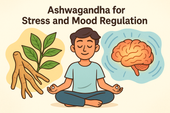
Ashwagandha for Stress and Mood Regulation
Discover how Ashwagandha, the powerful adaptogenic herb 🌿, helps your body manage stress and regulate mood. Learn how it balances cortisol, boosts GABA and serotonin, and supports emotional stability — helping you feel calm, focused, and resilient every day.
-

St. John’s Wort: Natural Support for Mild to Moderate Depression
Discover how St. John’s Wort, the “sunshine herb” 🌼, naturally supports mild to moderate depression. Learn how it boosts serotonin, balances mood, and promotes emotional resilience — with research showing its effectiveness compares to antidepressants, but with fewer side effects.
-
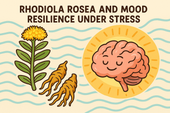
Rhodiola Rosea and Mood Resilience Under Stress
Discover how Rhodiola rosea helps your body adapt to stress 🌿. Learn how this powerful adaptogen balances cortisol, supports serotonin and dopamine, and strengthens emotional resilience — helping you stay calm, focused, and energized under pressure.
-
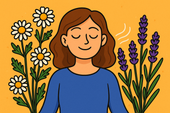
Chamomile and Lavender: Herbal Calm for Emotional Fluctuations
Discover how chamomile and lavender bring calm to emotional ups and downs 🌿. Learn how these two soothing herbs balance your nervous system, ease anxiety, and support restful sleep — naturally helping you find peace and emotional stability.
-
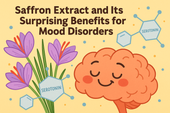
Saffron Extract and Its Surprising Benefits for Mood Disorders
Discover how saffron extract — the golden spice of joy 🌸 — can naturally support mood balance, ease anxiety, and lift mild depression. Learn what science says about its serotonin-boosting power, the ideal dosage, and how this ancient remedy compares to modern antidepressants.
-
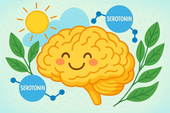
5-HTP and Serotonin: A Natural Path to Lifting Mood
Discover how 5-HTP naturally boosts serotonin 🌞 — the neurotransmitter behind mood, sleep, and emotional balance. Learn how this plant-derived compound supports happiness, reduces anxiety, and improves rest by helping your brain create more serotonin the gentle, natural way.
-
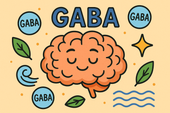
GABA Supplements for Reducing Anxiety and Mood Swings
Discover how GABA supplements can help reduce anxiety and balance mood naturally 🌿. Learn how this calming neurotransmitter works to quiet the mind, ease stress, and improve sleep — plus which nutrients and habits can boost your body’s own GABA production for long-term emotional stability.
-
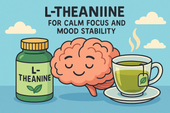
L-Theanine for Calm Focus and Mood Stability
Discover how L-theanine, the calming compound found in green tea 🍵, promotes focus, relaxation, and mood stability. Learn the science behind how it balances neurotransmitters, reduces stress hormones, and enhances clarity — helping you stay centered, calm, and productive without sedation.
-
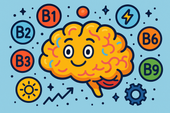
B Vitamins and Brain Chemistry: Supporting Energy and Emotional Balance
Discover how B vitamins power your brain chemistry ⚡. Learn how B6, B9, and B12 support serotonin, dopamine, and energy production — helping boost focus, mood, and emotional balance. From diet to supplements, explore how this vital nutrient group keeps your mind resilient and your energy steady.
-

N-Acetyl Cysteine (NAC) and Mood Disorders: What the Research Says
Learn how N-Acetyl Cysteine (NAC) supports brain health and mood balance 🧠. Discover how this antioxidant helps reduce oxidative stress, regulate glutamate, and improve emotional stability in depression, bipolar disorder, and anxiety — backed by cutting-edge psychiatric research.
-

Supplements for Bipolar Disorder: What May Support Stability
Discover the best supplements for bipolar disorder 🌿 that may support emotional stability and brain health. Learn how nutrients like omega-3s, magnesium, vitamin D, and NAC can help reduce inflammation, balance neurotransmitters, and complement traditional treatment safely.

















































